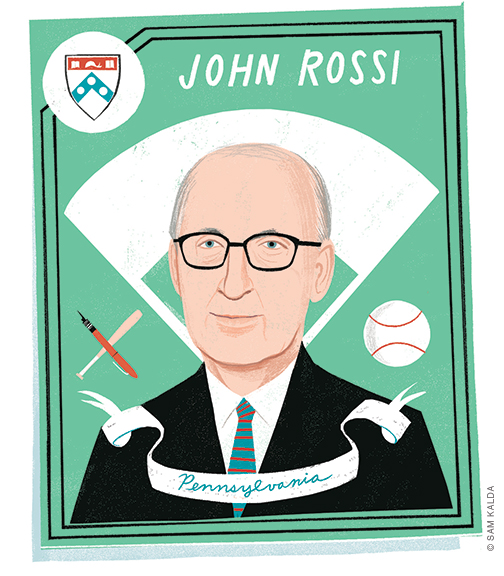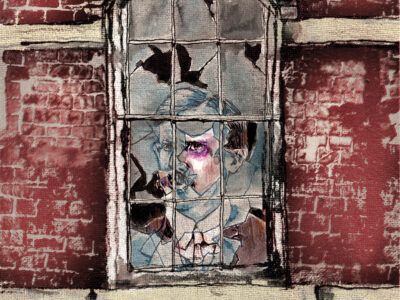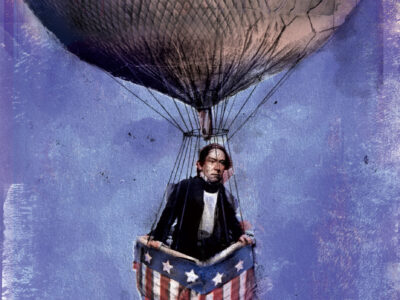
A baseball-loving emeritus professor of history writes books that provide a “template for understanding ourselves.”
When he was 12 years old, John Rossi Gr’65 went to a game at Philadelphia’s Shibe Park. Before the players took the field, he asked for an autograph from a pitcher standing in the visiting dugout. The pitcher, in a somewhat annoyed tone, asked, “Do you know who I am?”
“You’re Clyde Shoun, and you threw a no-hitter,” Rossi said. Shoun signed his baseball.
Even as a boy, Rossi knew a great deal about the game that was then still America’s national pastime. He went to his first ball game in 1944, when he was eight years old. Since then, he has helped students and readers understand how baseball has shaped American history through issues like integration, westward expansion, and free agency.
While researching his fourth baseball book— Baseball and American Culture: A History, to be published in January by Rowman & Littlefield—Rossi saw how the steroid era (the late 1990s and early 2000s) damaged the game but, ironically, may have saved it.
“Out of that came something no one could have predicted,” he says. “For more than 30 years, the baseball union and the management of baseball were at each other’s throats, and the drug issue forced the two of them together—possibly for the first time—to get the situation under control, including random drug testing, which certainly kept the sport from self-destructing.”
In 1991, nearly three decades after earning his doctorate in history at Penn, Rossi presented his first “academic” baseball paper at the Baseball Hall of Fame in Cooperstown, New York. The topic was “A Glorified Game of Rounders,” referring to the British game that, on this side of the pond, evolved into baseball.
As he started reading he noticed a man who had just entered the room. Afterwards, the man congratulated him on his talk. It was Harold Seymour, who—as Rossi well knew—launched baseball scholarship in 1960 by publishing the first serious history of the game. “If I’d have known it was him, I’d have been a wreck,” Rossi says.
Sol Gittleman, a professor of Judaic studies and former provost at Tufts University who is a member of the Society for American Baseball Research and taught a baseball seminar for 10 years, calls Rossi a “disciplined scholar who knows how to tell a story,” and says that his books have “enlightened their readers and provided an authentic narrative of American history, our vices and virtues, through the prism of American baseball.”
“The country grew up with baseball, and baseball grew up with the country,” Rossi explains. “Almost everything that happened in American history is reflected in baseball from one time or another. Baseball was also a way for immigrants to assimilate in society. First were the Irish, then the Germans, and by the end of the 19th century, the Poles and even American Indians were playing.”
Rossi offered his first course on baseball history in the 1980s at LaSalle University, where he is now a professor emeritus of history. He structured it into relatively distinct periods—the “dead ball” era, for example—and while examining baseball from 1946 to 1960, he noticed a pattern.
“That’s an interesting period for baseball, as it had to deal with integration, moving franchises, dealings with radio and television in a big way,” he says. Those developments, especially integration, happened in baseball before occurring in the rest of American society, he wrote. His observations led to his first baseball book, A Whole New Ball Game (1999).
His course, The National Game: Baseball and American Culture, caught the attention of a publisher, who asked him to adapt it into a book. Published in 2001, it covered the game up to the early 1990s.
His third book, published in 2005, covered a season that still haunts older fans of a certain local franchise: The 1964 Philadelphia Phillies: The Story of Baseball’s Most Memorable Collapse . The team had a six-and-a-half game lead with 12 games to go, then lost 10 straight and the pennant. (“Does it still hurt?” asks Rossi. “Hell, yeah!”)
In his view, “baseball’s dominance of sport ended in the 1960s when it was overtaken by football, which fit the frenetic nature of the time.” That development “didn’t bother me that much because I knew that throughout its history baseball had survived many crises: the league wars in the 19th century, the Black Sox scandal. I always believed baseball would survive and prosper because its roots were so deep in our culture.
“In the 1990s when labor militancy, owner stupidity, and designer drugs met, I was worried for the first time,” he admits. “But the game steadied and has entered a true golden age—because the quality of play at all levels has never been higher. That is partly related to the conditions in which baseball is played now. But mostly I believe the full integration of baseball, especially the emergence of the great Latin talent, is transforming the game. While it is certainly true that baseball is no longer the number one sport, those playing it are among the best athletes to ever play the game.”
—Jon Caroulis




